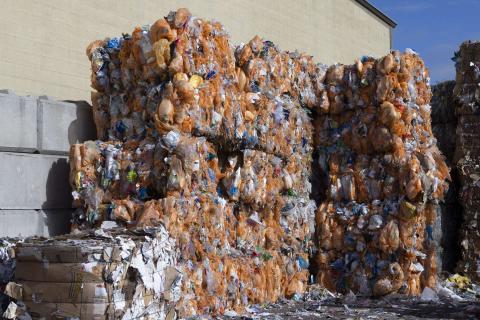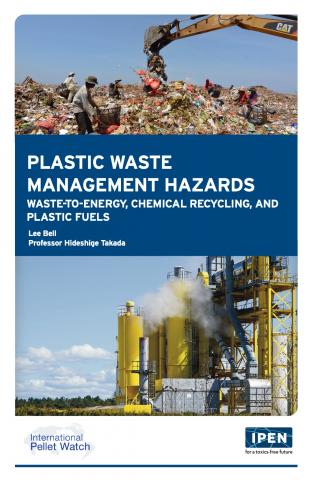The Plastic Recycling Myth

Orange bags filled with plastic waste in Boise. A recycling effort to turn this garbage into diesel fuel failed. It is now burned in a cement plant. REUTERS/Brian Losness
The story of plastic includes a belief that collecting and recycling bottles, cartons, single-use plastics, and so on, provides a way toward a greener future. But this story is wrong, or at least incomplete. Even as developing countries around the world developing centralized recycling programs, technologies to recycle plastics are failing to provide relief. And recyclers are defaulting to waste-to-energy markets — namely incineration — to absorb the glut of plastics. A new investigative report from Reuters, "The Recycling Myth: Big Oil’s Solution for Plastic Waste Littered with Failure", published 29 July 2021, details the ways in which the industries that create and recycle plastic are hiding the hard realities of plastic recycling: they're hard to separate; they are dirty and costly to clean; they contain additives that either pollute via wastes or contaminate the recycled plastics; and they are growing, with plastic waste expected to double in less than a generation.
In their report, Reuters journalists Joe Brock, Valerie Volcovici, and John Geddie, focus on "advanced recycling", which industry has put forth as a collection of solutions, but that have proven to be more costly and less effective than hoped. In one part of the story, a US-based recycling program, backed by Dow Chemical and US plastic bag maker Reynolds Consumer Products, began a special collection program focused on hard-to-recycle plastics, such as food containers and plastic films, hoping to convert them into diesel fuel. But the partner recycling program appears to have failed, and the plastics being collected are now being incinerated to help power a cement plant — a not-uncommon fate for cheap, high-BTU fuels required by the cement industry. And this isn't an isolated case. Similar efforts have been tried and either delayed or abandoned in the Netherlands, Indonesia, and elsewhere in the United States because they were not commercially viable.
IPEN's recent report Plastic Waste Management Hazards: Waste-to-Energy, Chemical Recycling, and Plastic Fuels details the many technologies and many failures of the industry to adequately and sustainably recycle plastics. While the industry touts the upside of chemical recycling of plastics, Reuters reports that even the industries own studies indicate that these solutions will contribute to global warming and the climate crisis, and further that such solutions were tried and abandoned 20 years ago by several giants of the fossil fuel industry itself. Most of the projects reviewed by Reuters use pyrolysis, a process that heats plastics in the absence of oxygen to chemical convert polymers into other carbon-rich products. According to the report:
In addition to consuming large amounts of energy, “pyrolysis can generate toxic waste, such as dioxins,” said Hideshige Takada, a geochemist and professor at the Tokyo University of Agriculture and Technology who has studied pollutants in waste for decades.
A numerical symbol that commonly appears on plastic packaging to identify the resin out of which the product is made. Nor has pyrolysis proven capable of transforming unsorted garbage into high-quality fuel and clean plastic resin, says Susannah Scott, a chemistry professor at the University of California, Santa Barbara, who receives funding from the plastics industry to perform recycling research.
Although people are beginning to wake up to how ineffective plastic recycling actually is, there is more work to do to help consumers understand the toxic effects of the plasticizers, stabilizers, colorizers, and other chemicals currently added to plastics. As long as plastic producers continue to deny the problem, perpetuate use of non-recyclable plastics, and look for unsustainable methods of disposal, we will continue to face the short- and long-term effects of the plastic crisis. Without turning off the tap at the source, by curtailing plastics use and by holding plastic producers responsible, the tsunami of plastic will overwhelm us all.
Read the full story on the Reuter's web site.

